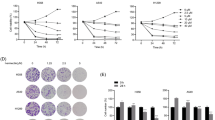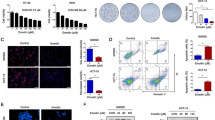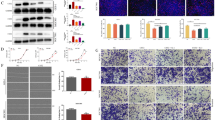Abstract
Gastric cancer (GC) treatment regimens are still unsatisfactory. Recently, Urolithin A (UroA) has gained tremendous momentum due to its anti-tumor properties. However, the therapeutic effect and underlying mechanisms of UroA in GC are unclear. We explored the effects and related mechanisms of UroA on GC both in vivo and in vitro. A Cell Counting Kit-8 was used to determine the influence of UroA on the proliferation of GC cell lines. The Autophagy inhibitor 3‐methyladenine (3MA) was employed to clarify the role of autophagy in the anti-tumor effect of UroA. Simultaneously, we detected the core-component proteins involved in autophagy and its downstream pathways. Subsequently, the in vivo anti-tumor effect of UroA was determined using a xenograft mouse model. Western blotting was used to detect the core protein components of the anti-tumor pathways, and 16S rDNA sequencing was used to detect the effect of UroA on the gut microbiota. We found that UroA suppressed tumor progression. The use of 3MA undermined the majority of the inhibitory effect of UroA on tumor cell proliferation, further confirming the importance of autophagy in the anti-tumor effect of UroA. Invigorating of autophagy activated the downstream Hippo pathway, thereby inhibiting the Warburg effect and promoting cell apoptosis. In addition, UroA modulated the composition of the gut microbiota, as indicated by the increase of probiotics and the decrease of pathogenic bacteria. Our research revealed new anti-tumor mechanisms of UroA, which may be a promising candidate for GC treatment.







Similar content being viewed by others
Availability of data and materials
The 16S rDNA seq data was has been deposited into the NCBI Sequence Read Archive database (PRJNA1076693).
References
Ahsan A, Zheng YR, Wu XL, Tang WD, Liu MR, Ma SJ, Jiang L, Hu WW, Zhang XN, Chen Z (2019) Urolithin A-activated autophagy but not mitophagy protects against ischemic neuronal injury by inhibiting ER stress in vitro and in vivo [J]. CNS Neurosci Ther 25(9):976–986
Ballesteros-Álvarez J, Nguyen W, Sivapatham R, Rane A, Andersen JK (2022) Urolithin A reduces amyloid-beta load and improves cognitive deficits uncorrelated with plaque burden in a mouse model of Alzheimer’s disease [J]. GeroScience 45(2):1095–1113
Bhatnagar PK, Awasthi A, Nomellini JF, Smit J, Suresh MR (2006) Anti-tumor effects of the bacterium Caulobacter crescentus in murine tumor models [J]. Cancer Biol Ther 5(5):485–491
Boxenbaum H, DiLea C (1995) First time in human dose selection: allied thoughts and perspectives [J]. J Clin Pharmacol 35(10):957–966
Cao W, Chen HD, Yu YW, Li N, Chen WQ (2021) Changing profiles of cancer burden worldwide and in China: a secondary analysis of the global cancer statistics 2020 [J]. Chin Med J (engl) 134(7):783–791
Chen Q, Huang X, Dong X, Wu J, Teng F, Xu H (2020) Long non-coding RNA ERICH3-AS1 is an unfavorable prognostic factor for gastric cancer [J]. PeerJ 8:e8050
Cheng F, Dou J, Zhang Y, Wang X, Wei H, Zhang Z, Cao Y, Wu Z (2021) Urolithin a inhibits epithelial– mesenchymal transition in lung cancer cells via P53-Mdm2-Snail pathway [J]. Onco Targets Ther 14:3199–3208
Deng P, Li K, Gu F, Zhang T, Zhao W, Sun M, Hou B (2021) LINC00242/miR-1-3p/G6PD axis regulates Warburg effect and affects gastric cancer proliferation and apoptosis [J]. Mol Med 27(1):9
Deran M, Yang J, Shen CH, Peters EC, Fitamant J, Chan P, Hsieh M, Zhu S, Asara JM, Zheng B et al (2014) Energy stress regulates hippo-YAP signaling involving AMPK-mediated regulation of angiomotin-like 1 protein [J]. Cell Rep 9(2):495–503
Grenda A, Iwan E, Chmielewska I, Krawczyk P, Giza A, Bomba A, Frak M, Rolska A, Szczyrek M, Kieszko R et al (2022) Presence of Akkermansiaceae in gut microbiome and immunotherapy effectiveness in patients with advanced non-small cell lung cancer [J]. AMB Express 12(1):86
Han B, Jiang P, Jiang L, Li X, Ye X (2021) Three phytosterols from sweet potato inhibit MCF7-xenograft-tumor growth through modulating gut microbiota homeostasis and SCFAs secretion [J]. Food Res Int 141:110147
Han B, Zhai Y, Li X, Zhao H, Sun C, Zeng Y, Zhang W, Lu J, Kai G (2023) Total flavonoids of Tetrastigma hemsleyanum Diels et Gilg inhibits colorectal tumor growth by modulating gut microbiota and metabolites [J]. Food Chem 410:135361
Heilman J, Andreux P, Tran N, Rinsch C, Blanco-Bose W (2017) Safety assessment of Urolithin A, a metabolite produced by the human gut microbiota upon dietary intake of plant derived ellagitannins and ellagic acid [J]. Food Chem Toxicol 108(Pt A):289–297
Karim S, Madani B, Burzangi AS, Alsieni M, Bazuhair MA, Jamal M, Daghistani H, Barasheed MO, Alkreathy H, Khan MA et al (2023) Urolithin A’s antioxidative, anti-inflammatory, and antiapoptotic activities mitigate doxorubicin-induced liver injury in Wistar rats [J]. Biomedicines 11(4):1125
Kharofa J, Apewokin S, Alenghat T, Ollberding NJ (2023a) Metagenomic analysis of the fecal microbiome in colorectal cancer patients compared to healthy controls as a function of age [J]. Cancer Med 12(3):2945–2957
Kharofa J, Haslam D, Wilkinson R, Weiss A, Patel S, Wang K, Esslinger H, Olowokure O, Sohal D, Wilson G et al (2023b) Analysis of the fecal metagenome in long-term survivors of pancreas cancer [J]. Cancer 129(13):1986–1994
Koo JH, Guan KL (2018) Interplay between YAP/TAZ and metabolism [J]. Cell Metab 28(2):196–206
Lee U, Cho EY, Jho EH (2022) Regulation of Hippo signaling by metabolic pathways in cancer [J]. Biochim Biophys Acta Mol Cell Res 1869(4):119201
Lehr K, Nikitina D, Vilchez-Vargas R, Steponaitiene R, Thon C, Skieceviciene J, Schanze D, Zenker M, Malfertheiner P, Kupcinskas J et al (2023) Microbial composition of tumorous and adjacent gastric tissue is associated with prognosis of gastric cancer [J]. Sci Rep 13(1):4640
Leung HKM, Lo EKK, El-Nezami H (2022) Theabrownin alleviates colorectal tumorigenesis in murine AOM/DSS model via PI3K/Akt/mTOR pathway suppression and gut microbiota modulation [J]. Antioxidants (Basel) 11(9):1716
Li L, Jiang H, Li Y, Xiang X, Chu Y, Tang J, Liu K, Huo D, Zhang X (2023) Chaetocin exhibits anticancer effects in esophageal squamous cell carcinoma via activation of Hippo pathway [J]. Aging 15:5426–5444
Li K, Xiao Y, Bian J, Han L, He C, El-Omar E, Gong L, Wang M (2022) Ameliorative effects of gut microbial metabolite urolithin A on pancreatic diseases [J]. Nutrients 14(12):2549
Liang N, Zhang C, Dill P, Panasyuk G, Pion D, Koka V, Gallazzini M, Olson EN, Lam H, Henske EP et al (2014) Regulation of YAP by mTOR and autophagy reveals a therapeutic target of tuberous sclerosis complex [J]. J Exp Med 211(11):2249–2263
Liu J, Huang X, Chen C, Wang Z, Huang Z, Qin M, He F, Tang B, Long C, Hu H et al (2023) Identification of colorectal cancer progression-associated intestinal microbiome and predictive signature construction [J]. J Transl Med 21(1):373
Ma M, Wang Y, Fan S, Huang Y, Su X, Lu C (2023) Urolithin A alleviates colitis in mice by improving gut microbiota dysbiosis, modulating microbial tryptophan metabolism, and triggering AhR activation [J]. J Agric Food Chem 71(20):7710–7722
Ma F, Sun M, Song Y, Wang A, Jiang S, Qian F, Mu G, Tuo Y (2022) Lactiplantibacillus plantarum-12 alleviates inflammation and colon cancer symptoms in AOM/DSS-treated mice through modulating the intestinal microbiome and metabolome [J]. Nutrients 14(9):1916
Maejima Y, Zablocki D, Nah J, Sadoshima J (2023) The role of the Hippo pathway in autophagy in the heart [J]. Cardiovasc Res 118(17):3320–3330
Mo JS, Meng Z, Kim YC, Park HW, Hansen CG, Kim S, Lim DS, Guan KL (2015) Cellular energy stress induces AMPK-mediated regulation of YAP and the Hippo pathway [J]. Nat Cell Biol 17(4):500–510
Mohammed Saleem YI, Albassam H, Selim M (2020) Urolithin A induces prostate cancer cell death in p53-dependent and in p53-independent manner [J]. Eur J Nutr 59(4):1607–1618
Peng Q, Hao L, Guo Y, Zhang Z, Ji J, Xue Y, Liu Y, Li C, Lu J, Shi X (2023) Dihydroartemisinin inhibited the Warburg effect through YAP1/SLC2A1 pathway in hepatocellular carcinoma [J]. J Nat Med 77(1):28–40
Rogovskii VS (2022) The therapeutic potential of urolithin A for cancer treatment and prevention [J]. Curr Cancer Drug Targets 22(9):717–724
Routy B, Le Chatelier E, Derosa L, Duong CPM, Alou MT, Daillère R, Fluckiger A, Messaoudene M, Rauber C, Roberti MP et al (2018) Gut microbiome influences efficacy of PD-1-based immunotherapy against epithelial tumors [J]. Science 359(6371):91–97
Sahashi H, Kato A, Yoshida M, Hayashi K, Naitoh I, Hori Y, Natsume M, Jinno N, Kachi K, Asano G et al (2022) Urolithin A targets the AKT/WNK1 axis to induce autophagy and exert anti-tumor effects in cholangiocarcinoma [J]. Front Oncol 12:963314
Sánchez-González C, Ciudad CJ, Izquierdo-Pulido M, Noé V (2016) Urolithin A causes p21 up-regulation in prostate cancer cells [J]. Eur J Nutr 55(3):1099–1112
Totiger TM, Srinivasan S, Jala VR, Lamichhane P, Dosch AR, Gaidarski AA 3rd, Joshi C, Rangappa S, Castellanos J, Vemula PK, Chen X, Kwon D, Kashikar N, VanSaun M, Merchant NB, Nagathihalli NS (2019) Urolithin A, a novel natural compound to target PI3K/AKT/mTOR pathway in pancreatic cancer [J]. Mol Cancer Ther 18(2):301–311
Tsoi H, Chu ESH, Zhang X, Sheng J, Nakatsu G, Ng SC, Chan AWH, Chan FKL, Sung JJY, Yu J (2017) Peptostreptococcus anaerobius induces intracellular cholesterol biosynthesis in colon cells to induce proliferation and causes dysplasia in mice [J]. Gastroenterology 152(6):1419–335
Tu HJ, Su CJ, Peng CS, Lin TE, Huangfu WC, Hsu KC, Hwang TL, Pan SL (2023) Urolithin A exhibits a neuroprotective effect against Alzheimer’s disease by inhibiting DYRK1A activity [J]. J Food Drug Anal 31(2):358–370
Wang W, Xiao ZD, Li X, Aziz KE, Gan B, Johnson RL, Chen J (2015) AMPK modulates Hippo pathway activity to regulate energy homeostasis [J]. Nat Cell Biol 17(4):490–499
Wang Y, Song Y, Zhou L, Wang M, Wang D, Bai J, Fu S, Yu J (2022) The Overexpression of TOB1 induces autophagy in gastric cancer cells by secreting exosomes [J]. Dis Markers 2022:7925097
Wang S, Zhuang Y, Xu J, Tong Y, Li X, Dong C (2023) Advances in the study of hexokinase 2 (HK2) inhibitors [J]. Anticancer Agents Med Chem 23(7):736–746
Wong SH, Yu J (2019) Gut microbiota in colorectal cancer: mechanisms of action and clinical applications [J]. Nat Rev Gastroenterol Hepatol 16(11):690–704
Xu T, Wei D, Yang Z, Xie S, Yan Z, Chen C, Hu W, Shi Z, Zhao Y, Cui M et al (2023) ApoM suppresses kidney renal clear cell carcinoma growth and metastasis via the Hippo-YAP signaling pathway [J]. Arch Biochem Biophys 743:109642
Yoon H, Kim NE, Park J, Shin CM, Kim N, Lee DH, Park JY, Choi CH, Kim JG, Park YS (2023) Analysis of the gut microbiome using extracellular vesicles in the urine of patients with colorectal cancer [J]. Korean J Intern Med 38(1):27–38
Zeng X, Jia H, Zhang X, Wang X, Wang Z, Gao Z, Yuan Y, Yue T (2021) Supplementation of kefir ameliorates azoxymethane/dextran sulfate sodium induced colorectal cancer by modulating the gut microbiota [J]. Food Funct 12(22):11641–11655
Zhai L, Yang X, Dong J, Qian L, Gao Y, Lv Y, Chen L, Chen B, Zhou F (2023) O‑GlcNAcylation mediates endometrial cancer progression by regulating the Hippo‑YAP pathway [J]. Int J Oncol 63(2):90
Zhang Z, Shao S, Zhang Y, Jia R, Hu X, Liu H, Sun M, Zhang B, Li Q, Wang Y (2020) Xiaoyaosan slows cancer progression and ameliorates gut dysbiosis in mice with chronic restraint stress and colorectal cancer xenografts [J]. Biomed Pharmacother 132:110916
Zhang X, Coker OO, Chu ES, Fu K, Lau HCH, Wang YX, Chan AWH, Wei H, Yang X, Sung JJY et al (2021) Dietary cholesterol drives fatty liver-associated liver cancer by modulating gut microbiota and metabolites [J]. Gut 70(4):761–774
Zhang C, Hu A, Li J, Zhang F, Zhong P, Li Y, Li Y (2022) Combined non-invasive prediction and new biomarkers of oral and fecal microbiota in patients with gastric and colorectal cancer [J]. Front Cell Infect Microbiol 12:830684
Zhang Y, Jiang L, Su P, Yu T, Ma Z, Liu Y, Yu J (2023a) Urolithin A suppresses tumor progression and induces autophagy in gastric cancer via the PI3K/Akt/mTOR pathway [J]. Drug Dev Res 84(2):172–184
Zhang W, Xu X, Cai L, Cai X (2023b) Dysbiosis of the gut microbiome in elderly patients with hepatocellular carcinoma [J]. Sci Rep 13(1):7797
Zhu W, Li J, Chen Y, Liu Z, Zhang Q, Kang C (2023) AC1Q3QWB inhibits colorectal cancer progression by modulating the immune response and balancing the structure of the intestinal microbiota [J]. Int Immunopharmacol 116:109768
Funding
This work is supported by the National Natural Science Foundation of China (82070587), the Pudong New Area Clinical Characteristic Discipline Project (Grant No. PWYts2021-11), the Affiliated Suzhou Hospital of Nanjing Medical University (Szslyyrc2023022), and the Key Discipline of Shanghai Pudong Hospital (Zdxk2020-07).
Author information
Authors and Affiliations
Contributions
Jingyuan Xu, Qiaoyun Xia, Zhirong Chen and Xiaolan Lu conceived and designed the study. Yixiao Qiao, Qiaoyun Xia, Xukun Cao, Jingyuan Xu, Zhengdong Qiao, Longyun Wu, Zhirong Chen, Longbao Yang and Xiaolan Lu conducted the experiment. Jingyuan Xu, and Qiaoyun Xia analyzed the data. Qiaoyun Xia wrote the manuscript. Jingyuan Xu, Zhirong Chen, Longbao Yang and Xiaolan Lu revised the manuscript. The authors declare that all data were generated in-house and that no paper mill was used.
Corresponding authors
Ethics declarations
Ethical approval
All procedures performed in studies involving animal experiments were in accordance with the ethical standards of the Animal Ethics Committee of Fudan University Pudong Medical Center. and with the National Institutes of Health Guide for the care and use of Laboratory animals (NIH Publications No. 8023, revised 1978).
Competing interests
The authors declare no competing interests.
Additional information
Publisher's Note
Springer Nature remains neutral with regard to jurisdictional claims in published maps and institutional affiliations.
Supplementary Information
Below is the link to the electronic supplementary material.
Rights and permissions
Springer Nature or its licensor (e.g. a society or other partner) holds exclusive rights to this article under a publishing agreement with the author(s) or other rightsholder(s); author self-archiving of the accepted manuscript version of this article is solely governed by the terms of such publishing agreement and applicable law.
About this article
Cite this article
Qiao, Y., Xia, Q., Cao, X. et al. Urolithin A exerts anti-tumor effects on gastric cancer via activating autophagy-Hippo axis and modulating the gut microbiota. Naunyn-Schmiedeberg's Arch Pharmacol (2024). https://doi.org/10.1007/s00210-024-03043-5
Received:
Accepted:
Published:
DOI: https://doi.org/10.1007/s00210-024-03043-5




